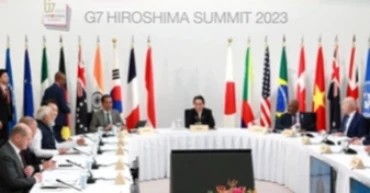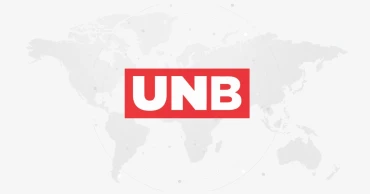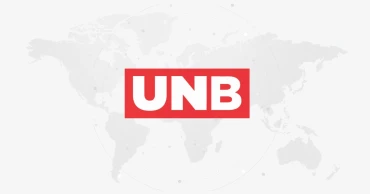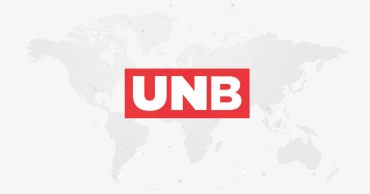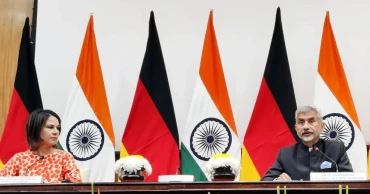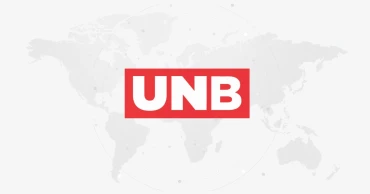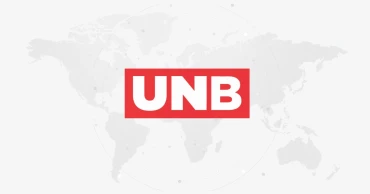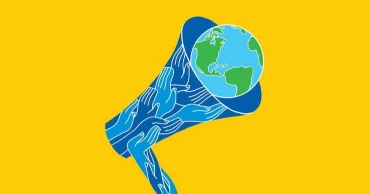G7
Chinese FM spokesperson slams G7 summit's hyping up of China-related issues
A Chinese foreign ministry spokesperson on Saturday made remarks on G7 Hiroshima Summit's hyping up of China-related issues, urging the countries to stop ganging up to form exclusive blocs.
According to reports, the G7 Hiroshima Leaders' Communique and other documents adopted at the G7 Hiroshima Summit contain comments on the situation in the Taiwan Strait and accusations regarding the East China Sea, the South China Sea, Hong Kong, Xinjiang, Tibet and China's nuclear power, professed G7 opposition to any unilateral attempts to change the status quo and claims about "economic coercion" that allude to China.
The spokesperson said the G7 makes high-sounding claims about "promoting a peaceful, stable and prosperous world," but what it does is hindering international peace, undermining regional stability and curbing other countries' development. That simply shows how little international credibility means to the G7.
Also Read: G7 urges China to press Russia to end war in Ukraine, respect Taiwan's status, fair trade rules
Despite China's serious concerns, the G7 used issues concerning China to smear and attack China and brazenly interfere in China's internal affairs. China strongly deplores and firmly opposes this and has made serious demarches to the summit's host Japan and other parties concerned, the spokesperson said.
The spokesperson stressed that resolving the Taiwan question is a matter for the Chinese, a matter that must be resolved by the Chinese. The one-China principle is the solid anchor for peace and stability in the Taiwan Strait.
Noting that the G7 keeps emphasizing cross-Strait peace, and yet says nothing about the need to oppose "Taiwan independence," the spokesperson said this in effect constitutes connivance and support for "Taiwan independence" forces, and will only result in having a serious impact on cross-Strait peace and stability.
Affairs related to Hong Kong, Xinjiang and Tibet are purely China's internal affairs, the spokesperson said, stressing that China firmly opposes interference by any external force in those affairs under the pretext of human rights.
China is a firm defender and contributor to international maritime rule of law, the spokesperson said, adding that the East China Sea and the South China Sea have remained overall stable. Relevant countries need to respect regional countries' efforts to uphold peace and stability and stop using maritime issues to drive a wedge between regional countries and incite bloc confrontation.
On "economic coercion", the spokesperson said the massive unilateral sanctions and acts of "decoupling" and disrupting industrial and supply chains make the U.S. the real coercer that politicizes and weaponizes economic and trade relations, urging the G7 not to become an accomplice in economic coercion.
Noting that China is firmly committed to a defensive nuclear strategy, the spokesperson said China has honored its pledge to "no first use" of nuclear weapons and always kept its nuclear capabilities at the minimum level required by national security.
China is the only one among the five nuclear weapon states to have made those pledges. China's position is above board and should not be distorted or denigrated, the spokesperson added.
The international community does not and will not accept the G7-dominated Western rules that seek to divide the world based on ideologies and values, still less will it succumb to the rules of exclusive small blocs designed to serve "America-first" and the vested interests of the few, the spokesperson said, urging G7 to reflect on its behavior and change course.
"We urge G7 members to catch up with the trend of the times, focus on addressing the various issues they have at home, stop ganging up to form exclusive blocs, stop containing and bludgeoning other countries, stop creating and stoking bloc confrontation and get back to the right path of dialogue and cooperation," said the spokesperson.
2 years ago
Ukraine’s Zelenskyy at center of last day of high-level diplomacy as G7 looks to punish Russia
World leaders ratcheted up pressure Sunday on Russia for its war against Ukraine, with Ukrainian President Volodymyr Zelenskyy at the center of a swirl of diplomacy on the final day of the Group of Seven summit of rich-world democracies.
Zelenskyy's in-person attendance at one of the world's premier diplomatic gatherings is meant to galvanize attention on his nation's 15-month fight against Russia. Even before he landed Saturday on a French plane, the G7 nations had unveiled a slew of new sanctions and other measures meant to punish Moscow and hamper its war-fighting abilities.
Ukraine is the overwhelming focus of the summit, but the leaders of Japan, the United States, the United Kingdom, France, Germany, Canada and Italy, as well as the European Union, are also working to address global worries over climate change, AI, poverty, economic instability and nuclear proliferation.
Also Read: Ukrainian president meets with world leaders at G7 as Russia claims a key victory in the war
Two U.S. allies — South Korea and Japan — continued efforts Sunday to improve ties that have often been hurt by lingering anger over issues linked to Japan's brutal 1910-1945 colonization of the Korean Peninsula. Japanese Prime Minister Fumio Kishida and South Korean President Yoon Suk Yeol visited a memorial to Korean victims, many of them slave laborers, of the Aug. 6, 1945, atomic bombing.
Washington wants the two neighbors, both of which are liberal democracies and bulwarks of U.S. power in the region, to stand together on a host of issues, including rising aggression from China, North Korea and Russia.
Bolstering international support is a key priority as Ukraine prepares for what's seen as a major push to take back territory seized by Russia in the war that began in February last year. Zelenskyy's visit to the G7 summit closely followed the United States agreeing to allow training on potent American-made fighter jets, which lays the groundwork for their eventual transfer to Ukraine.
Also Read: Zelenskyy says ‘Bakhmut is only in our hearts’ after Russia claims controls of Ukrainian city
"Japan. G7. Important meetings with partners and friends of Ukraine. Security and enhanced cooperation for our victory. Peace will become closer today," Zelenskyy tweeted after his arrival.
U.S. national security adviser Jake Sullivan said that President Joe Biden and Zelenskyy would have direct engagement at the summit. On Friday, Biden announced his support for training Ukrainian pilots on U.S.-made F-16 fighter jets, a precursor to eventually providing those aircraft to Ukraine.
"It is necessary to improve (Ukraine's) air defense capabilities, including the training of our pilots," Zelenskyy wrote on his official Telegram channel after meeting Italian Premier Giorgia Meloni, one of a number of leaders he talked to.
Zelenskyy also met on the sidelines of the summit with Indian Prime Minister Narendra Modi, their first face-to-face talks since the war, and briefed him on Ukraine's peace plan, which calls for the withdrawal of Russian troops from the country before any negotiations.
India, the world's largest democracy, has avoided outright condemnation of Russia's invasion. While India maintains close ties with the United States and its Western allies, it is also a major buyer of Russian arms and oil.
Summits like the G7 are a chance for leaders to put pressure on one another to align or redouble their diplomatic efforts, according to Matthew Goodman, an economics expert at the Center for Strategic and International Studies think tank in Washington. "Zelenskyy's presence puts some pressure on G7 leaders to deliver more — or explain to him directly why they can't," he said.
Russian Foreign Minister Sergey Lavrov criticized the G7 summit for aiming to isolate both China and Russia.
"The task has been set loudly and openly: to defeat Russia on the battlefield, but not to stop there, but to eliminate it as a geopolitical competitor. As a matter of fact, any other country that claims some kind of independent place in the world alignment will also be to suppress a competitor. Look at the decisions that are now being discussed and adopted in Hiroshima, at the G7 summit, and which are aimed at the double containment of Russia and China," he said.
The G7, however, has vowed to intensify the pressure.
"Russia's brutal war of aggression represents a threat to the whole world in breach of fundamental norms, rules and principles of the international community. We reaffirm our unwavering support for Ukraine for as long as it takes to bring a comprehensive, just and lasting peace," the group said in a statement.
Another major focus of the meetings was China, the world's No. 2 economy.
There is increasing anxiety that Beijing, which has been steadily building up its nuclear weapons program, could try to seize Taiwan by force, sparking a wider conflict. China claims the self-governing island as its own and regularly sends ships and warplanes near it.
The G7 said they did not want to harm China and were seeking "constructive and stable relations" with Beijing, "recognizing the importance of engaging candidly with and expressing our concerns directly to China."
They also urged China to pressure Russia to end the war in Ukraine and "support a comprehensive, just and lasting peace."
China's Foreign Ministry said that "gone are the days when a handful of Western countries can just willfully meddle in other countries' internal affairs and manipulate global affairs. We urge G7 members to ... focus on addressing the various issues they have at home, stop ganging up to form exclusive blocs, stop containing and bludgeoning other countries."
The G7 also warned North Korea, which has been testing missiles at a torrid pace, to completely abandon its nuclear bomb ambitions, "including any further nuclear tests or launches that use ballistic missile technology," the leaders' statement said.
The green light on F-16 training is the latest shift by the Biden administration as it moves to arm Ukraine with more advanced and lethal weaponry, following earlier decisions to send rocket launcher systems and Abrams tanks. The United States has insisted that it is sending weapons to Ukraine to defend itself and has discouraged attacks by Ukraine into Russian territory.
"We've reached a moment where it is time to look down the road again to say what is Ukraine going to need as part of a future force, to be able to deter and defend against Russian aggression as we go forward," Sullivan said.
Biden's decisions on when, how many, and who will provide the fourth-generation F-16 fighter jets will be made in the months ahead while the training is underway, Biden told leaders.
The G7 leaders have rolled out a new wave of global sanctions on Moscow as well as plans to enhance the effectiveness of existing financial penalties meant to constrain President Vladimir Putin's war effort. Russia is now the most-sanctioned country in the world, but there are questions about the effectiveness.
Russia had participated in some summits with the other seven countries before being removed from the then-Group of Eight after its 2014 annexation of Crimea.
The latest sanctions aimed at Russia include tighter restrictions on already-sanctioned people and firms involved in the war effort. More than 125 individuals and organizations across 20 countries have been hit with U.S. sanctions.
Kishida has twice taken leaders to visit to a peace park dedicated to the tens of thousands who died in the world's first wartime atomic bomb detonation. Kishida, who represents Hiroshima in parliament, wants nuclear disarmament to be a major focus of discussions.
The G7 leaders also discussed efforts to strengthen the global economy and address rising prices that are squeezing families and government budgets around the world, particularly in developing countries in Africa, Asia and Latin America.
The group reiterated its aim to pull together up to $600 billion in financing for the G7's global infrastructure development initiative, which is meant to offer countries an alternative to China's investment dollars.
2 years ago
Ukrainian president meets with world leaders at G7 as Russia claims a key victory in the war
Ukrainian President Volodymyr Zelenskyy huddled with some of his biggest backers in Hiroshima on Sunday, building momentum for his country's war effort even as Russia claimed a symbolic victory on the battlefield.
The Ukrainian leader's in-person appearance in his trademark olive drab during the final day of the Group of Seven summit underscored the centrality of the war for the bloc of rich democracies. It also stole much of the limelight from other priorities, including security challenges in Asia and outreach to the developing world, that the leaders focused on at the three-day gathering.
Zelenskyy held two major rounds of meetings Sunday, one with G7 leaders and a second with them and a host of invited guests including India, South Korea and Brazil. He also held one-on-one talks with several of the leaders.
Also Read: Zelenskyy says ‘Bakhmut is only in our hearts’ after Russia claims controls of Ukrainian city
U.S. President Joe Biden announced a new military aid package worth $375 million for Ukraine during his meeting with Zelenskyy, saying the U.S. would provide ammunition and armored vehicles. That fresh pledge came days after the U.S. agreed to allow training on American-made F-16 fighter jets, laying the groundwork for their eventual transfer to Ukraine.
"We have Ukraine's back and we're not going anywhere," Biden said.
Zelenskyy thanked Biden for the support, adding that "we will never forget."
Even before Zelenskyy landed Saturday aboard a French plane, the G7 nations had unveiled a slew of new sanctions and other measures meant to punish Moscow over its invasion that began in February last year.
Read More: G7 'outreach' an effort to build consensus on global issues like Ukraine, China, climate change
Hanging over Sunday's talks was the claim by Russia's Defense Ministry that forces of the Wagner private army, backed by Russian troops, had seized the Ukrainian city of Bakhmut. The eight-month battle for the eastern city — seen by both sides as a major symbolic prize — has been the longest and likely the bloodiest of the war.
Asked if Bakhmut was still in Ukraine's hands, Zelenskyy said he thought that Russian forces had finally taken the city in a siege that "destroyed everything."
"For today, Bakhmut is only in our hearts. There is nothing in this place," Zelenskyy said, adding that the fight had left nothing in Bakhmut but a lot of "dead Russians."
While Ukraine was the overwhelming focus of the summit, the leaders of Japan, the United States, the United Kingdom, France, Germany, Canada and Italy, as well as the European Union, also aimed to address global worries over climate change, AI, poverty, economic instability and nuclear proliferation.
Biden also aimed to reassure world leaders that the U.S. would not default because of the debt limit standoff that has cast a large shadow over his trip.
Two U.S. allies — South Korea and Japan — continued efforts Sunday to improve ties that have often been hurt by lingering anger over issues linked to Japan's brutal 1910-1945 colonization of the Korean Peninsula. Japanese Prime Minister Fumio Kishida and South Korean President Yoon Suk Yeol visited a memorial to Korean victims, many of them slave laborers, of the Aug. 6, 1945, atomic bombing.
Washington wants the two neighbors, both of which are liberal democracies and bulwarks of U.S. power in the region, to stand together on issues, including rising aggression from China, North Korea and Russia.
Biden, Yoon and Kishida met briefly as a group outside the summit venue posing for photos in front of Hiroshima Bay. Biden invited the two leaders to visit Washington for a trilateral meeting and they accepted, a US official who briefed reporters on condition of anonymity said.
Zelenskyy also met on the sidelines of the summit with Indian Prime Minister Narendra Modi, their first face-to-face talks since the war, and briefed him on Ukraine's peace plan, which calls for the withdrawal of Russian troops from the country before any negotiations.
India, the world's largest democracy, has avoided outright condemnation of Russia's invasion. While India maintains close ties with the U.S. and its Western allies, it is also a major buyer of Russian arms and oil.
Summits like the G7 are a chance for leaders to put pressure on one another to align or redouble their diplomatic efforts, according to Matthew Goodman, an economics expert at the Center for Strategic and International Studies think tank in Washington.
"Zelenskyy's presence puts some pressure on G7 leaders to deliver more — or explain to him directly why they can't," he said.
Russian Foreign Minister Sergey Lavrov criticized the summit for aiming to isolate both China and Russia.
"The task has been set loudly and openly: to defeat Russia on the battlefield, but not to stop there, but to eliminate it as a geopolitical competitor," he said.
The G7, however, has vowed to intensify the pressure, calling Russia's assault on Ukraine "a threat to the whole world in breach of fundamental norms, rules and principles of the international community."
The group took a different approach in its comments on China, the world's No. 2 economy. There is increasing anxiety that Beijing, which has been steadily building up its nuclear weapons program, could try to seize self-governing Taiwan by force, sparking a wider conflict.
The G7 said they did not want to harm China and was seeking "constructive and stable relations" with Beijing, "recognizing the importance of engaging candidly with and expressing our concerns directly to China."
They also urged China to pressure Russia to end the war in Ukraine and "support a comprehensive, just and lasting peace."
China's Foreign Ministry said that "gone are the days when a handful of Western countries can just willfully meddle in other countries' internal affairs and manipulate global affairs. We urge G7 members to ... focus on addressing the various issues they have at home, stop ganging up to form exclusive blocs, stop containing and bludgeoning other countries."
The G7 also warned North Korea, which has been testing missiles at a torrid pace, to completely abandon its nuclear weapon ambitions, "including any further nuclear tests or launches that use ballistic missile technology," the leaders' statement said.
The G7 leaders have rolled out a new wave of global sanctions on Russia, now the most-sanctioned country in the world, as well as plans to enhance the effectiveness of existing financial penalties meant to constrain President Vladimir Putin's war effort.
The latest sanctions aimed at Russia include tighter restrictions on already-sanctioned people and firms involved in the war effort. More than 125 individuals and organizations across 20 countries have been hit with U.S. sanctions.
Russia had participated in some summits with the other seven countries before being removed from the then-Group of Eight after its 2014 annexation of Crimea.
Kishida, mindful of the host city's symbolic importance, has twice taken leaders to visit to a peace park dedicated to the tens of thousands who died in the world's first wartime atomic bomb detonation. He had wanted nuclear disarmament to be a major focus of discussions.
Some survivors of the 1945 atomic bomb attack and their families worried that Zelenskyy's inclusion at the summit overshadowed that priority. Etsuko Nakatani, an activist whose parents survived the Hiroshima atomic bombing, said the leader's visit was "not appropriate for Hiroshima, which is a peace-loving city."
Protesters carrying "No War No G7" banners briefly scuffled with riot police deployed as part of a massive show of force throughout the city during a march Sunday.
The G7 leaders also discussed efforts to strengthen the global economy and address rising prices that are squeezing families and government budgets around the world, particularly in developing countries in Africa, Asia and Latin America. They reiterated their aim to pull together up to $600 billion in financing for the G7's global infrastructure development initiative, which is meant to offer countries an alternative to China's investment dollars.
2 years ago
G7 finance leaders vow to contain inflation, strengthen supply chains but avoid mention of China
The Group of Seven’s top financial leaders united Saturday in their support for Ukraine and their determination to enforce sanctions against Russia for its aggression but stopped short of any overt mention of China.
The finance ministers and central bank chiefs ended three days of talks in Niigata, Japan, with a joint statement pledging to bring inflation under control, help countries struggling with onerous debts and strengthen financial systems.
They also committed to collaborating to build more stable, diversified supply chains for developing clean energy sources and to “enhance economic resilience globally against various shocks.”
The statement did not include any specific mention of China or of “economic coercion” in pursuit of political objectives, such as penalizing the companies of countries whose governments take actions that anger another country.
Also Read: G-7 talks focus on ways to fortify banks, supply chains as China accuses group of hypocrisy
Talk this week of such moves by China had drawn outraged rebukes from Beijing. Officials attending the talks in this port city apparently balked at overtly condemning China, given the huge stake most countries have in good relations with the rising power and No. 2 economy.
The finance leaders' talks laid the groundwork for a summit of G-7 leaders in Hiroshima next week that President Joe Biden is expected to attend despite a crisis over the U.S. debt ceiling that could result in a national default if it is not resolved in the coming weeks.
Japanese Finance Minister Shunichi Suzuki said that Treasury Secretary Janet Yellen mentioned the issue in a working dinner, but he refrained from saying anything more.
While in Niigata, Yellen warned that a failure to raise the debt ceiling to enable the government to continue paying its bills would bring an economic catastrophe, destroying hundreds of thousands of jobs and potentially disrupting global financial systems. No mention of the issue was made in the finance leaders' statement.
The G-7's devotion to protecting what it calls a “rules-based international order” got only a passing mention.
The leaders pledge to work together both within the G-7 and with other countries to “enhance economic resilience globally against various shocks, stand firm to protect our shared values, and preserve economic efficiency by upholding the free, fair and rules-based multilateral system,” it said.
G-7 economies comprise only a tenth of the world’s population but about 30% of economic activity, down from roughly half 40 years ago. Developing economies like China, India and Brazil have made huge gains, raising questions about the G-7's relevance and role in leading a world economy increasingly reliant on growth in less wealthy nations.
China had blasted as hypocrisy assertions by the U.S. and other G-7 countries that they are safeguarding a “rules-based international order” against “economic coercion” from Beijing and other threats.
China itself is a victim of economic coercion, Chinese Foreign Ministry spokesperson Wang Wenbin said Friday.
“If any country should be criticized for economic coercion, it should be the United States. The U.S. has been overstretching the concept of national security, abusing export controls and taking discriminatory and unfair measures against foreign companies,” Wang said in a routine news briefing.
China accuses Washington of hindering its rise as an increasingly affluent, modern nation through trade and investment restrictions. Yellen said they are “narrowly targeted” to protect American economic security.
Despite recent turmoil in the banking industry, the G-7 statement said the financial system was “resilient” thanks to reforms implemented during the 2008 global financial crisis.
“Nevertheless, we need to remain vigilant and stay agile and flexible in our macroeconomic policy amid heightened uncertainty about the global economic outlook,” it said.
Meanwhile, inflation remains “elevated" and central banks are determined to bring it under control, it said.
Since prices remain “sticky,” some countries may see continued rate hikes, said Kazuo Ueda, Japan’s central bank governor. “The impact of the rate hikes has not been fully realized,” he told reporters.
Japan won support for its call for a “partnership” to strengthen supply chains to reduce the risk of disruptions similar to those seen during the pandemic, when supplies of items of all kinds, from medicines to toilet paper to high-tech computer chips, ran short in many countries.
Suzuki said details of that plan would be worked out later.
“Through the pandemic, we learned that supply chains tended to depend on a limited number of countries or one country,” he said, adding that economic security hinges on helping more countries develop their capacity to supply critical minerals and other products needed as the world switches to carbon-emissions-free energy.
Tensions with China, and with Russia over its war on Ukraine, inevitably loomed large during the talks in Japan, the G-7's only Asian member.
“We call for an immediate end of Russia’s illegal war against Ukraine, which would clear one of the biggest uncertainties over the global economic outlook,” the joint statement said.
The financial leaders took time to listen to ideas on how to focus more on welfare in policymaking, rather than just GDP and other numerical indicators that often drive decisions with profound impacts on people's well being.
“These efforts will help preserve confidence in democracy and a market-based economy, which are the core values of the G-7,” the finance leaders' statement concluded.
Suzuki said he and other leaders learned much from a seminar by Columbia University economist Joseph Stiglitz, a Nobel prize winner who worked in the Clinton administration and who has championed what he calls “progressive capitalism.”
It's a "very interesting view," Suzuki said, adding that “so far, we’ve been mostly focused on GDP and other numerical indicators."
2 years ago
Europe can’t put its energy needs first while requesting India to act otherwise: Jaishankar
With the G7 price ceiling on Russian crude oil at USD 60 per barrel taking effect, India on Monday (December 05, 2022) vehemently defended its acquisition of crude oil from Russia during the ongoing Ukraine war – claiming that New Delhi’s purchase was just one-sixth of the European buy in the previous nine months.
At a press conference following lengthy discussions with the visiting German foreign minister Annalena Baerbock, Indian External Affairs Minister S Jaishankar said that Europe cannot decide to put its energy needs first while requesting New Delhi to take another action, claiming that talks between India and Russia to increase trade began long before the war in Ukraine, NDTV reports.
Jaishankar said: “I understand that there is a conflict situation (in Ukraine). I also understand that Europe has a point of view and Europe will make the choices it will make that is Europe’s right. But for Europe to make choices which prioritises its energy needs and then ask India to do something else…”
Read: Russian oil shipments to central Europe expected to resume
Jaishankar also said that pressure on pricing is also being exerted by Europe’s purchases of Middle Eastern crude oil.
The Indian foreign minister commented, “And bear in mind, today, Europe is buying a lot (of crude oil) from the Middle-East. The Middle-East was traditionally a supplier for an economy like India. So it puts pressure on prices in the Middle-East as well. We have been very very understanding of the European choices and European policies.”
He was quoted by NDTV as saying: “I think first we need to establish the facts very clearly. Between February 24 and November 17, the European Union has imported more fossil fuel from Russia than the next 10 countries combined. The oil import in the European Union is like six times what India has imported. Gas is infinite because we do not import it while the European Union imported 50 billions Euros worth (of gas).”
Read: Bangladesh may prefer to import Russian oil via third country
While pledging to further cooperate in the areas of defence and security, commerce, climate change, and renewable energy, the two foreign ministers also signed a bilateral mobility agreement that would make it simpler for individuals to study and work in each other’s countries.
The German foreign minister stated at the joint news conference that China has changed significantly in recent years and “the whole region can see this and feel this”, in reference to the country’s “growing aggressiveness”.
Baerbock, who was in India for a two-day visit, also promised to shorten the wait time for visas. The talks also touched on Pakistani cross-border terrorism, the situation in Afghanistan, and developments in the Indo-Pacific, according to the NDTV report.
Read: Fuel import from India through pipeline to start from 2023: PM
Russian oil imports into India have significantly increased during the past few months. According to New Delhi, it is its essential responsibility to make sure that Indian consumers have the greatest possible access to the worldwide markets on the most favourable conditions.
3 years ago
COP27: Bangladesh among first recipients of Global Shield financial support
The Vulnerable Twenty (V20) Group of Finance Ministers of the Climate Vulnerable Forum (CVF) that includes 58 climate vulnerable economies, and the Group of Seven (G7) on Monday (November 14, 2022) officially launched the Global Shield against Climate Risks – an initiative for pre-arranged financial support designed to be quickly deployed in times of climate disasters.
The first recipients of Global Shield packages – called ‘Pathfinder Countries’ – include Bangladesh, Costa Rica, Fiji, Ghana, Pakistan, the Philippines and Senegal, according to a message UNB received from COP27 being held in Egypt’s Sharm El-Sheikh.
The Global Shield will start its implementation immediately after COP27.
Initial contributions include around EUR 170 million from Germany and more than EUR 40 million from other countries.
Also read: Climate Change: IOM DDG calls for redoubling efforts ahead of COP 27
In addition, a broad coalition of countries, multilateral institutions, non-state and private sector partners has underlined their full institutional commitment to the Global Shield.
Ghana Finance Minister Ken Ofori-Atta, V20 Chair, called this is a path-breaking effort and hoped the funding window will benefit equally compared to the pre-existing structures whose performance remain to be proven.
“Our fiscal space is under constant threat and the inflationary pressures of climate change are closing out our options. As part of our Climate Prosperity Plan to reduce the 98 percent financial protection sinkhole, the Global Shield will play a key role in resourcing financial and social protection packages to protect our economy, our enterprises and our communities,” Ken said.
Ken said the Global Shield is long overdue. “It has never been a question of who pays for loss and damage because we are paying for it – our economies pay for it in lost growth prospects, our enterprises pay for it in business disruption, and our communities pay for it in lives and livelihoods lost.”
Also read: D-8 PTA likely to be operational this year to boost intra-trade
Svenja Schulze, Federal Development Minister of Germany, said that under the German presidency, the G7 have committed to scale-up action and support on loss and damage and to work towards a “Global Shield against Climate Risks”, responding to the V20’s call.
“Germany stands by its responsibility to support poor and vulnerable people and countries in dealing with loss and damage. This launch sends a signal: We have heard the urgency and we are acting. We aim at overcoming differences even in challenging circumstances. Germany wants to be a bridge-builder.”
Henry Kokofu, Special Envoy of the Climate Vulnerable Forum (CVF) Ghana Presidency, said: “This is definitely the start we need, but the more effective we are in innovations like the Shield, the more we have to emphasize that scale matters.”
Recent V20 research found that 98% of the nearly 1.5 billion people in V20 countries do not have financial protection – a massive sinkhole for these countries whose workforce is mainly employed by small and medium enterprises.
Read More: COP27: Bangladesh urges developed countries to double climate financing by 2025
According to this research, V20 countries have lost a total of USD 525 billion to climate impacts since 2000.
As risks of losses and damages from climate change escalate further, the cost of capital and debt have risen to unsustainable levels, especially across climate vulnerable economies.
The Global Shield addresses current weaknesses in the financial protection structure in climate vulnerable economies via pre-arranged finance which disburses quickly and reliably before or just after disasters happen.
It expands instruments of financial protection for governments, communities, businesses, and households, thus, lessening the impact of disasters, making vulnerable economies resilient, safeguarding sustainable development, and protecting lives and livelihoods.
Read More: Bangladesh wins COP27 award for community-led initiative
Germany is providing some EUR 170 million as seed contribution, of which EUR 84 million are core funding to the Global Shield and EUR 85.5 million for related climate risk finance instruments.
Further pledges of core funding to the Global Shield include DKK 35 million (about EUR 4.7 million) from Denmark, EUR 10 million from Ireland, USD 7 million from Canada, and EUR 20 million from France. Further contributions by donors are expected to materialize soon.
The V20 and G7 have decided that it will be steered by the Global Shield High-Level Consultative Group, which includes representatives of the V20, G7, G20, think tanks, civil society, multilateral organizations and the private sector.
A financing structure with three complementary funds forms the foundation of the Global Shield against Climate Risks: the Global Shield Solutions Platform, which builds on InsuResilience Solutions Fund, the Global Shield Financing Facility at the World Bank, and the Climate Vulnerable Forum (CVF) & V20 Joint Multi-Donor Fund.
Read More: What can COP27 do for climate vulnerable countries?
3 years ago
COP27: Bangladesh to reiterate call to materialize $100bn pledged for developing countries
Global leaders are preparing for the COP27 next month — to take action towards achieving collective climate goals set under Paris Agreement and the Convention.
The 27th Conference of the Parties to the United Nations Framework Convention on Climate Change, or ‘COP27’, will build on the outcomes of COP26 to deliver action on an array of issues critical to tackling the climate emergency.
These are: urgently reducing greenhouse gas emissions, building resilience and adapting to the inevitable impacts of climate change, and delivering on the commitments to finance climate action in developing countries.
Also read: Dhaka calls for implementation of climate financing pledges ahead of COP27
Bangladesh will reiterate its call to materialize the pledge of providing US$ 100 billion funds per year to developing countries at the earliest, officials said.
Bangladesh will also highlight the importance of “enhanced funds” for climate change mitigation and adaptation at the conference that will take place from November 6 to 18 in Sharm el-Sheikh, Egypt.
Nations are expected to demonstrate at COP27 that they are in a new era of implementation by turning their commitments under the Paris Agreement into action.
Read V20, G7 reach agreement on financial protection against climate change loss
Heads of states and governments will attend the Sharm el-Sheikh Climate Implementation Summit on November 7 and 8 while a high-level segment primarily attended by ministers will take place from November 15-18.
The Vulnerable 20 (V20) and Group of 7 (G7) will jointly launch the Global Shield Against Climate Risks at COP27 in a wider effort to accelerate pre-arranged financing at speed and scale.
The V20 membership stands at 58 economies representing some 1.5 billion people including Bangladesh.
Read Climate Change: IOM DDG calls for redoubling efforts ahead of COP27
The Vulnerable 20 Group of Finance Ministers from climate vulnerable economies and the G7 Presidency have already announced they have reached agreement on a financial protection cooperation that responds to loss and damage as a contribution to the Paris Climate Treaty.
Foreign Minister AK Abdul Momen has called for implementation of climate financing pledges commensurate with the principles of loss and damage ahead of the climate conference going to take place in Sharm El Sheikh next month.
State Minister for Planning Dr Shamsul Alam has said Bangladesh firmly believes that climate change is a security issue and it must be discussed at a regular interval at the United Nations Security Council (UNSC).
Read UN Resident Coordinator stresses urgency of fighting climate change
Bangladesh has been a significant player in global climate diplomacy and during the presidency of CVF, Bangladesh emerged as a bold voice in the climate change negotiations under the leadership of Prime Minister Sheikh Hasina.
Bangladesh has launched the “Mujib Climate Prosperity Plan” with the aim to put her on a journey from climate vulnerability to resilience to climate prosperity. The government sees it as one of the landmark policy guidelines for climate vulnerable countries.
As government representatives begin to finalize the agenda for the COP27 climate change conference in Egypt next month, the UN chief told journalists in New York that the work ahead is “as immense as the climate impacts we are seeing around the world”.
“At COP27, I will launch an action plan to provide early warning systems for all within five years,” said UN Secretary General Antonio Guterres. He urged the governments, international financial institutions and civil society to support it.
Read Bangladeshi youths join Global Climate Strike
“We came out of Paris, COP21, with a historic agreement which set out a framework of what needs to be done, and then in Glasgow last year, an agreement on how to do it,” said Simon Stiell, the sixth Executive Secretary of the UN Framework Convention on Climate Change (UNFCCC) or UN Climate Change.
2022 marks seven years since the adoption of the Paris Agreement on Climate Change - a landmark international treaty to tackle the climate crisis.
The agreement calls for limiting global warming to well below 2°C above pre-industrial levels and pursuing efforts to limit it to 1.5°C. To get there, the world needs to halve its carbon emissions by 2030.
Read What can COP27 do for climate vulnerable countries?
3 years ago
V20, G7 reach agreement on financial protection against climate change loss
The Vulnerable 20 (V20) and Group of 7 (G7) will jointly launch the Global Shield Against Climate Risks at COP27 in a wider effort to accelerate pre-arranged financing at speed and scale.
The Vulnerable 20 Group of Finance Ministers — from climate-vulnerable economies — and the G7 Presidency have announced they have reached an agreement on financial protection cooperation that responds to loss and damage as a contribution to the Paris Climate Treaty.
V20 Chair Ken Ofori-Atta, Finance Minister of the Republic of Ghana, and Svenja Schulze, German Federal Minister for Economic Cooperation and Development, from the G7 Presidency met in Washington DC to conclude the final details of the Global Shield, according to a joint media release received from Washington DC early Saturday.
Read Dhaka calls for implementation of climate financing pledges ahead of COP27
The V20 membership stands at 58 economies representing some 1.5 billion people including Bangladesh.
The Group of 7 (G7) consists of Canada, France, Germany, Italy, Japan, the UK and the USA.
The European Union also participates in G7 meetings.
Germany took on the presidency of the Group of 7 from the United Kingdom on 1st January this year. The presidency lasts for one year.
Read US, Egypt launch group to prepare for COP27 climate summit
Ofori-Atta said they are pleased that the G7 Presidency of Germany has partnered with the V20 on the Global Shield Against Climate Risks.
It is obvious that their socio-economic losses are compounding due to the increased severity and scale of climate-fuelled risks, said the Minister.
V20’s debt service payments alone are half a trillion US dollars over the next four years, and on top of that, the Group is facing inflation and currency depreciation against the dollar.
Read Civil Society calls for protecting climate vulnerable women and girls
Pre-arranged funding and the efficient delivery of subsidies for insurance through the V20 Trust Fund is critical to ensure that we do not increase our debt burdens.
It is important to recognize that we do not ask for charity. What we need is stronger economic cooperation through Climate Prosperity Plans between the developed world and the climate vulnerable countries of the world.
"We need new investments enabled by protection instruments under the Global Shield to fortify our economies, supply chains and communities against these accelerating climate risks. I am pleased that Ghana is part of the pathfinder countries under the Global Shield and look forward to expedited action so we can scale up this intervention across the African continent and the rest of the developing world,” Ofori-Atta said.
Read Cabinet sends back National Adaptation Plan on climate change for modification
Schulze said climate change is already a dramatic reality and it is no longer a question of whether climate change-related loss and damage will happen, it is only how often it will occur – and how fierce and how expensive it is, and most importantly, who is affected most.
"To stop the climate crisis from becoming worse, we need to drive global climate action with even greater commitment," said Schulze.
"This includes that we must acknowledge that there is climate-related loss and damage and that the most vulnerable countries, in particular, need our solidarity in dealing with it," said the German Minister.
Read Bangladeshi youths join Global Climate Strike
"This is where we want to build bridges for the upcoming global climate conference in Egypt by putting forward concrete solutions. The world needs concrete action more than words in order to deal with loss and damage," Schulze said.
Together with the most vulnerable developing countries, Schulze said, they have taken a big step in this regard.
"The decision to build together a Global Shield against Climate Risks will offer millions of vulnerable and poor people financial and social protection after climate disasters.”
Read UN experts alarmed by restrictions on civil society ahead of climate summit
The Global Shield includes the following:
Strengthened coordination within the global climate and disaster risk finance and insurance (CDRFI) architecture across G7, V20, and other climate-vulnerable economies to ensure coherence of different institutions’ and donors’ efforts at the global, regional and national levels.
A global, flexible, and collaborative financing structure to mobilise and pool respective donor and other funds and enable a more systematic global approach to closing protection gaps.
Sustained protection in the face of increasing climate risks by scaling up existing successful CDRFI programmes, including social protection schemes, and preparing country-specific, needs-based CDRFI support packages, including the scaling up of smart premium and capital support to address affordability barriers.
Read CSOs demand Bangladesh put loss, damage finance on COP27 agenda
Formed in 2015, the V20 Group of Finance Ministers is dedicated cooperation of economies systematically vulnerable to climate change.
Currently chaired by the Republic of Ghana, V20 Group members are also states of the Climate Vulnerable Forum (CVF).
The Global Shield builds on the InsuResilience Global Partnership which the V20 and G20 previously introduced with a goal of insuring 500 million people in climate-vulnerable countries by 2025.
Read Climate Change: IOM DDG calls for redoubling efforts ahead of COP 27
The Global Shield Against Climate Risks at COP27 is a wider approach that encompasses an acceleration of these efforts including social protection schemes, with V20 and G7 members.
3 years ago
